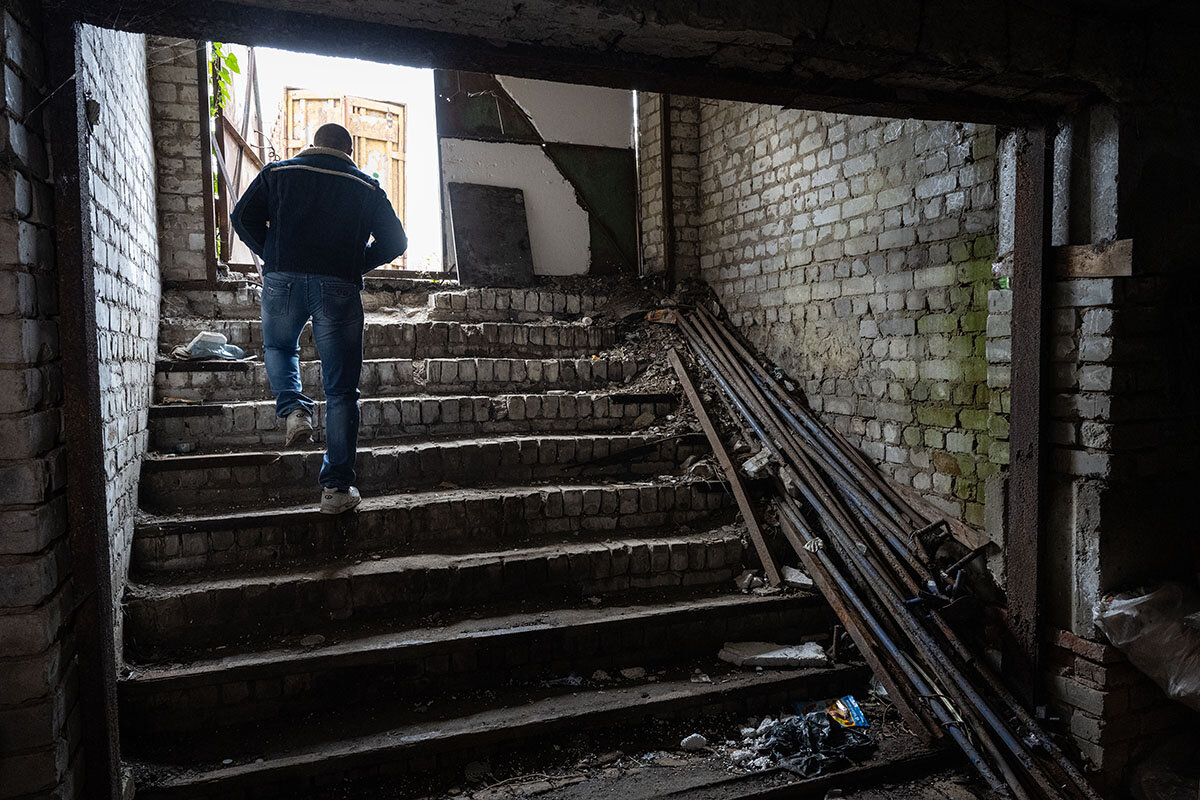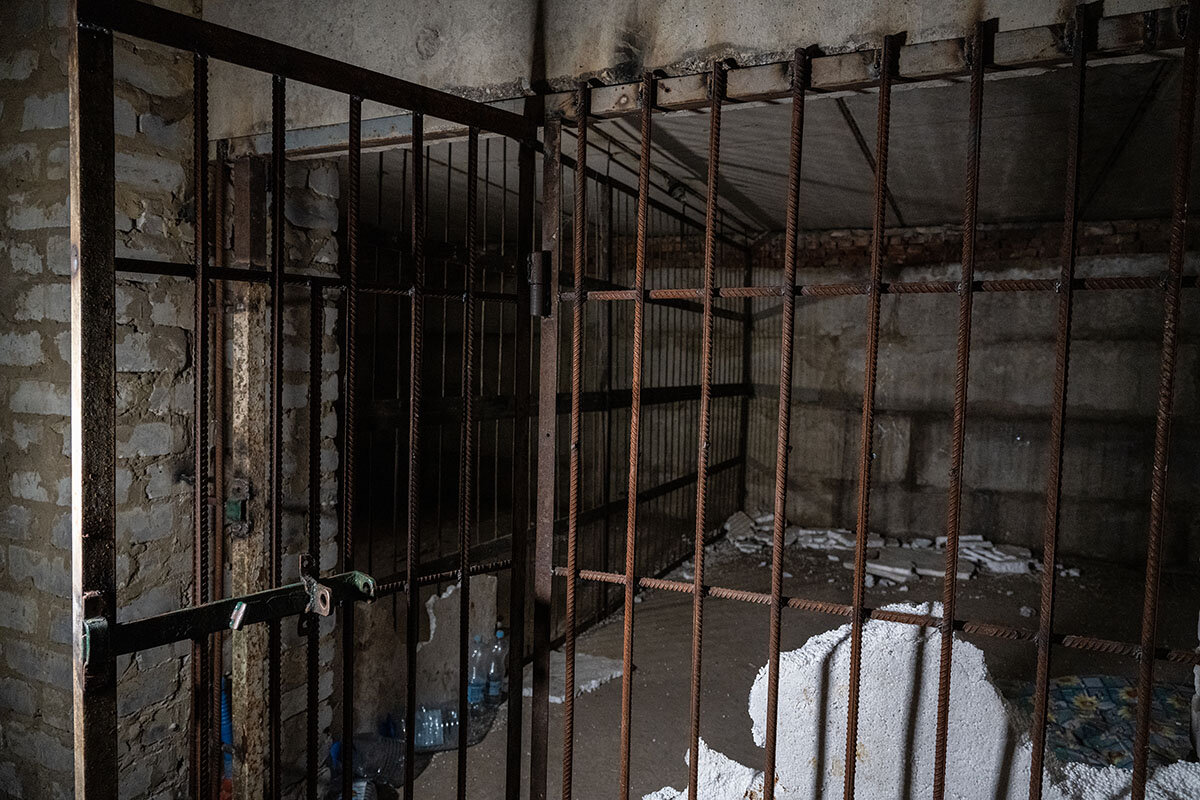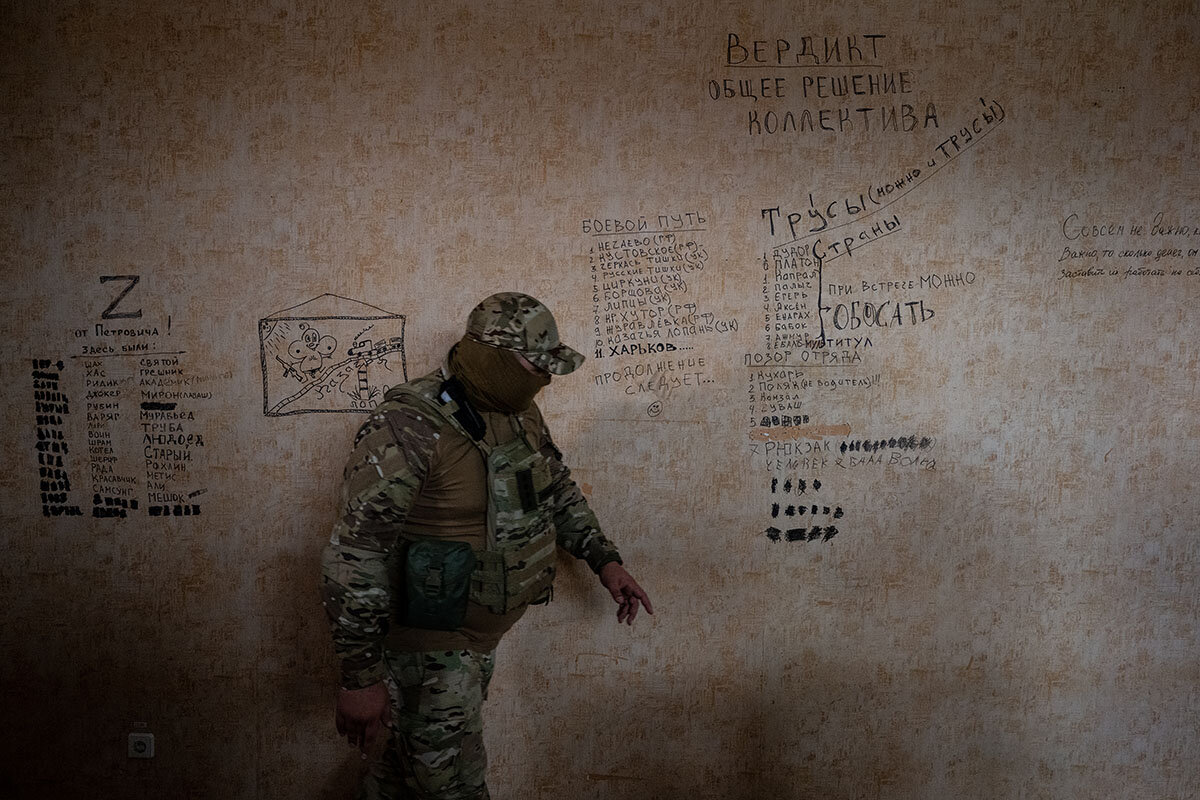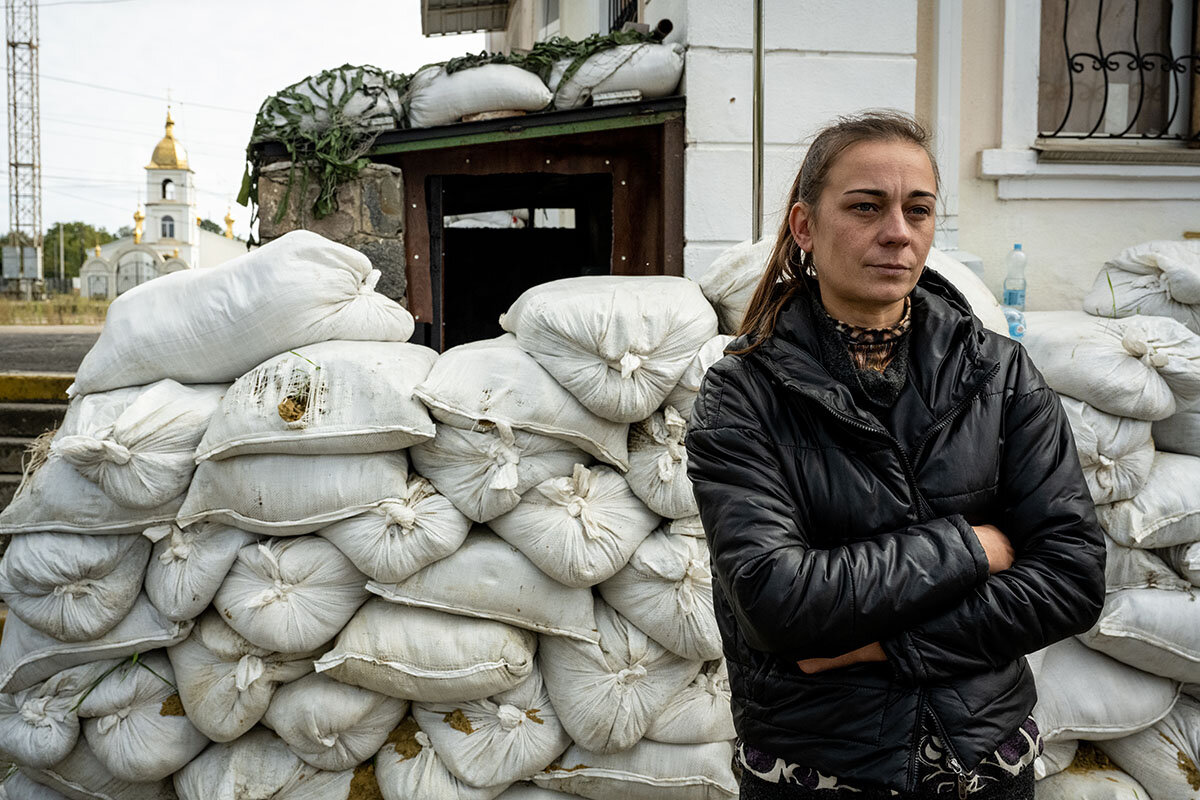In Ukraine’s liberated areas, weight of Russian occupation lingers
Loading...
| KOZACHA LOPAN, UKRAINE
With the Russian border no farther away than the arcing trajectory of a rifle round, the Ukrainian combat veteran had no chance to escape when Russian troops invaded Ukraine last February.
“I knew I would be captured … so I was waiting for this,” recalls Vitalii, a veteran of fighting Russians and their proxy forces in the eastern Donbas region in 2014 and 2015. His wife buried his Ukrainian military documents – including his commendations as a soldier – but a local boy-turned-collaborator pointed out Vitalii’s house.
Russian troops broke two of his ribs, and for one hour applied electricity to his body with a modified old-style rotary phone, in “revenge” for his previous military service.
Why We Wrote This
For civilians and former soldiers in liberated parts of Ukraine, the memory of six months of Russian occupation is fresh as they seek to reclaim their dignity. Accounts of abuse are still emerging.
As he recounts his ordeal, Vitalii stands in a dank and dark basement beside a makeshift cage welded by the Russians for detainees. His is one of a growing compendium of personal stories – from this northern town to Balakliia, Izium, and Kupiansk, farther east – attempting to restore dignity and respect after experiencing the grim pressures of living for half a year under Russian occupation.
The accounts – replete with horrific incidents of abuse and still-missing Ukrainian citizens – are now emerging across the northeast Kharkiv region, after a Ukrainian counteroffensive in September forced Russian troops to retreat from some 3,000 square miles.
The basement cage is strewn with two thin mattresses, crumpled dirty sheets, broken pieces of plastic foam for insulation, and several disposable plastic bowls. Vitalii says he doesn’t know if this is the cage he was held in, because his eyes were taped closed, and this is not the only basement detention cage found in town.
What he does remember is the pain was so great that he tried to smash his head on the floor, to knock himself out.
“They beat me everywhere but my head,” says Vitalii, who asked that he not be further identified. Sparing his head was because he was to appear on Russian television, which is widely watched in eastern Ukraine.
“The Russians used me as a ‘Nazi’ soldier, and asked: ‘Where were you [fighting in the Donbas]? Who did you kill?” he recalls. “I was supposed to say to Ukrainians on Russian TV, ‘Hey guys, you should give up.’”
Vitalii was held in the underground cage for five days, and then five days more upstairs at the Kozacha Lopan train station – where all rooms were full of fellow detainees, sitting back-to-back, he says. He was moved to another site in a nearby village, before being released.
Losing hearts and minds
Across the region, residents describe Russian forces tracking down Ukrainian veterans, officials, and anyone they deemed to be anti-Russian or a possible insurgent, even as they portrayed their presence on Ukrainian soil as permanent and benevolent, with victory assured.
Details of detention and heavy-handed abuse echo widely across the Kharkiv region, as they have in other territories reclaimed by Ukraine. If winning hearts and minds was a Russian strategy, such actions turned that on its head.
“The torture and the way they ‘talked’ to people only made it worse for the Russians,” says a Security Service of Ukraine (SBU) officer who asked to be identified only by his call sign, Raven.
“This [detention] place was built, and Russian actions only made more hatred and more [Ukrainian] patriotism,” he says, referring to the makeshift cage. SBU officers facilitated a trip for journalists in late September to Kozacha Lopan, which they said then was still dangerous due to the proximity of the Russian border and the presence of remaining collaborators.
Indeed, in Kozacha Lopan and nearby villages, the post-occupation picture is further complicated by a sizable portion of residents who were sympathetic to the Russian invasion at the outset of the war.
“Half the village was pro-Russian; now they are all hidden,” says a woman, with a black shirt and a faux-diamond Chanel brooch, who gave the name Yulia. Her husband, Andrii, was a veteran of the Donbas war and a retired Ukrainian officer, who fled to avoid arrest but was caught.
The Russians “came to the house and took my son and all our phones,” recalls the distraught mother, speaking near a wall of sandbags outside the Kozacha Lopan train station, where a gold letter Z, the symbol of Russia’s military campaign here, is spray-painted on the wall.
“They were calm. They asked, ‘Yulia, where is your husband?’ They knew him already. A collaborator pointed him out; he was a patriotic Ukrainian,” she recalls.
Every day she came from her village to a checkpoint in town, to ask the Russians there about her husband. She was told he was “alive and fine,” but sometimes the Russian troops would “look at each other, laugh, and tell me, ‘No soldier will ever give you this information.’”
The Russians didn’t harm civilians, asserts Yulia, aside from taking people’s cars and “trashing” them with hard driving, stealing valuables – including her son’s ring and necklace, when they detained him for 11 days – and even defecating in abandoned houses.
“Why [defecate] on carpets?” asks Yulia, still surprised at that particular vulgarity.
Andrii is still missing, weeks after Russian troops withdrew.
“The Russians were telling everyone they were very good, and that everything was good on the front line,” says Yulia. “They acted here as if on their own land. … The Russians constantly said, ‘Everything is OK. Victory is ours.’”
Bad behavior by Russian forces changed the minds of some Ukrainians who supported them, but most Russian sympathizers are “quiet and angry” now, or say they don’t care, because they were “very happy” when Russians were here, adds Yulia.
The Russians’ brutality appears to have been applied to their own soldiers as well, according to lists on a wall found at a Ukrainian border guard headquarters used by Russian troops.
Beneath a large letter Z written in black permanent marker appears to be a list of soldiers, with more than one-third of them crossed out – presumably because they had been killed, suggests SBU officer Raven.
The graffiti notes the “final decision of the team,” which applauds one list of soldiers who were in the “fighting way.” It names locations along the unit’s path of advance, and counts as the 11th objective Kharkiv, then adds, “to be continued,” with a smiley face.
Yet one other list is of “scaredy cat” soldiers of the country, who can be urinated upon “if you meet them.” Another list appears to present a worse category of those Russian soldiers who are the “shame of the unit” – several of those are also crossed out, as if casualties.
Children sent to Russian camp
The price paid by Ukrainian families during the Russians’ presence was not limited to detentions, about which stories emerge from every corner of territory reclaimed from Russia.
Indeed, the accounts include the treatment of children like Karina, age 13, who, along with scores of other Ukrainian children in occupied territories, was sent to summer camp in Russia. Some camps were advertised as simple summer holidays, while others promised more Russian patriotic fare.
The risks of traveling to a neighboring country that has mounted an invasion force were high, amid persistent reports of Russian forces taking hundreds of unaccompanied Ukrainian children across the border into Russia, calling them orphans, and putting them up for adoption.
From Kozacha Lopan, some 13 children were sent by their parents to the Little Bear camp in Krasnodar, some 450 miles to the southeast, near Russia’s Black Sea coast. Karina was meant to return Sept. 19 after 21 days, but by then Russian troops had retreated, and Karina’s young mother, Natalia, lost contact.
“Here there was constant shelling and it was dangerous. I let my daughter go to refresh herself,” says Natalia. When Ukraine recaptured Kozacha Lopan, families of the other children went to Russia to be with their children, but Natalia says she could not afford it.
Now other mothers she had been in contact with no longer answer her calls.
“I can’t say whether I trust the Russians or not, but I hope she comes back,” says Natalia. “I think we are all human beings, and they [Russians] are also human.”
Igor Ishchuk supported reporting for this article.












